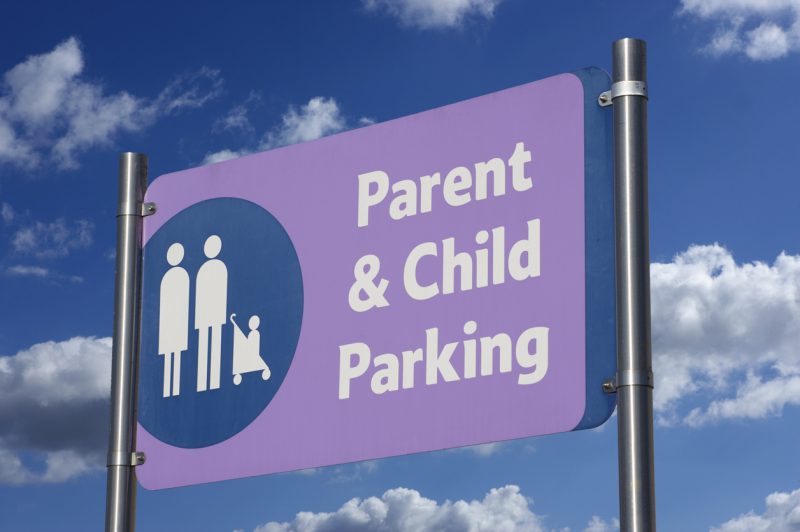
Who hasn’t been tempted to leave their motor in one of those handy parent and child parking bays at the supermarket? After all, they’re extra wide and usually conveniently positioned right next to the main doors. And they’re often empty. What harm could it do?
But slipping into one, even for a few minutes, could land you a hefty fine if you don’t comply with the supermarket’s terms and conditions.
Parent and child parking bays – the law?
Supermarket car parks are private land. That means the rules can differ from site to site. In some you may get away with parking in them scot-free without having a child on board – other than perhaps disapproving looks. In others, you may need to have children that you take out of the car. And in yet more, your kids may need to be in booster seats for you to escape a fine.

How do you know if you can park freely?
If supermarkets decide they’re going to enforce parent and child parking bays, they must put up signs explaining the rules. These will tell you the ins and outs of what you can and can’t do. Before parking in these parent and child parking bays it’s important that you read the terms and conditions.
How old must children be?
Again, this depends on the individual supermarket or the company it sub-contracts management of its car parking to. Children are usually defined as being under 12 years old. But in some car parks, to use the parking space you must have at least one baby or toddler. The advice from experts is to have your children with you and take them into the store with you.
How much will a fine be?
The company managing the car park can issue a parking charge notice. This could be as much as £100.
A parking charge notice is different to the penalty charge notice you may receive if you park illegally on the street. When you enter a private car park (essentially what a supermarket car park is), you are doing so on the condition that you’ll abide by their rules.
If you don’t stick to these rules, they can charge you for breaking them; the parking charge notice is effectively an invoice for that.
What if you can’t park there?
If you’re in any doubt over whether to park in a parent and child parking bay, it’s probably best that you move your car. The parking space you go to may not be as convenient but at least you won’t get a fine.
It’s worth remembering that in 2020, one parent was fined £260 because she parked in one of these bays and left her sick child sleeping in the car with its older siblings.
Can you appeal a parking charge notice?
Yes you can. The first thing to do if you find a ticket on your windscreen is to check the supermarket’s signposts. Take a photograph of them too. If you think you’ve been wrongly ticketed, don’t pay the ticket. This is considered to be an admission of guilt.
Then find out who issued the ticket. Contact them to understand how to challenge their ticket. If they reject your challenge, you can appeal to an independent appeals service.
They will probably belong to an accredited body such as the British Parking Association (BPA) or International Parking Community (IPC). For BPA members, contact Parking on Private Land Appeals. For IPC members, get in touch with the Independent Appeals Service.
Hmm Yes, an excwllant facilty, BUT there is also a greater need now for the older generation, still able to get about, but needing the space to fully open the car door to get out of and bck into their car.